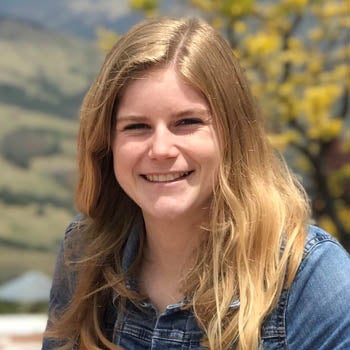Major: Ecology and Evolutionary Biology
Minors: Biochemistry and Cell Biology, Medical Humanities
Research Advisor: Volker Rudolf
Junior Hannah Towbin had long found the beauty and complexity of nature fascinating, but it was not until she realized how deeply integrated evolution was with her interest in human health that she decided to become an Ecology and Evolutionary Biology major. “Evolutionary concepts both challenged me and excited me as I began to connect ecology and evolution to my other interests in medicine, cell biology, genetics, and immunology,” she said.
“My favorite thing about being an EBIO major is the freedom I have in tailoring my degree to my own interests,” she said. “EBIO, like all other majors, requires a certain number of courses that students have to take, but after that, you are really free to choose how you'd like to proceed. EBIO provides a range of courses that delve into such topics as Animal Behavior, Biology of Infectious Diseases, Biochemistry, Evolution of Genes and Genomes, and many, many others,” she explained. The flexible structure of the major has allowed Towbin not only to shape her in-major electives to her personal passions, but also to double-minor in Biochemistry and Cell Biology and Medical Humanities and still fulfill her remaining pre-medical requirements.
Towbin furthers her investigation of evolution and ecology through research in the lab of Volker Rudolf here on campus. “The Rudolf Lab seeks to investigate ecological dynamics on an evolutionary, population, and community level,” Towbin explained. Her work with the graduate student mentor Joey Neale focuses on how temperature influences predator-prey dynamics in an aquatic ecosystem, a particularly vital topic in an ever-warming world. “It is my hope to later extend this research further to investigate how these temperature-affected predator-prey dynamics influence the transmission of infectious diseases,” she said.
Neale and Towbin seek to characterize the temperature-dependent changes in prey intake for certain predators of an aquatic arthropod called Daphnia pulex. D. pulex is a widespread water flea whose range includes multiple continents, and the species influences ecosystems by serving as a major food species for numerous types of vertebrates and invertebrates alike. “I love studying the classic struggle of predator versus prey,” Towbin said. “These observations inform research dedicated to understanding evolutionary arms races, infectious disease transmission, population dynamics, and natural selection, all of which are incredibly exciting and incredibly important in the biology of our world.”
“What motivates me most about this project is the potential for increased understanding of predator-prey dynamics in the natural world. The more we know about how these population dynamics manifest themselves, the better we can inform policy decisions when it comes to wildlife and habitat protection, an area in which I am very passionate about,” Towbin pointed out.
Outside of research and academics, Towbin finds an outlet for her competitive spirit in Rice Powderpuff. “I grew up playing all kinds of sports, from soccer to softball to swimming and, for a time, roller hockey. When I decided not to pursue the student-athlete life, I found myself missing that competition and fun,” she said. “Rice Powderpuff has been one of the greatest experiences I've had here. Women's Flag Football is a way for me to make new friends, be active, and represent my residential college.”
After graduation, Towbin will take a gap year before applying to medical school. “I am considering volunteer projects abroad, going to work in a hospital, or even potentially working as an EMT during that time,” she said. “Once I get to medical school, I plan to pursue a surgical field that allows me to develop long-term relationships with my patients.” The broad ecological and evolutionary understanding of biology and disease that Towbin has developed at Rice will inform a unique medical perspective and serve her well as a health professional.

